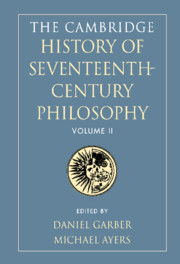35 - Divine/natural law theories in ethics
from VII - Will, Action, and Moral Philosophy
Published online by Cambridge University Press: 28 March 2008
Summary
The attempt to understand morality in the legalistic terms of a natural law is ancient but is now mostly associated with the formulation given it by Thomas Aquinas in the late thirteenth century. Earlier natural law is commonly seen as leading up to Aquinas’s paradigmatic version, whereas later natural law is understood as deriving from it. This approach has resulted in long-standing disputes about the status of Protestant natural law vis-à-vis Thomism, disputes generally centring on the question of the originality of Hugo Grotius, commonly considered ‘the father of modern natural law’. It is easy to understand why there should be such disagreements. The sources reveal an extraordinary degree of continuity between scholastic – and not only Thomistic – natural law and the natural law doctrines which dominated Protestant Europe during the seventeenth century and much of the eighteenth. Yet it seemed to moral philosophers of these centuries, and especially to the modern natural lawyers themselves, that something decisively new happened with Grotius. Protestant natural law was seen as a distinct school of moral philosophy until the history of philosophy was redrawn by Kant and by others working in the light of his philosophy.
The resolution of these disputes has in some measure been frustrated by the predominant concentration on the rôle of Grotius. While conveying to Protestant Europe large parts of the natural law material used by the great scholastic thinkers, especially those of sixteenth-century Spain, Grotius’s underlying theory contained elements which his successors considered dangerous. In their commentaries on Grotius’s text and histories of their discipline, later natural lawyers glossed over or repudiated these elements and ascribed Grotius’s novelty to ideas which were in fact not at all new to him but which were important to them.
- Type
- Chapter
- Information
- The Cambridge History of Seventeenth-century Philosophy , pp. 1317 - 1357Publisher: Cambridge University PressPrint publication year: 2000
- 5
- Cited by

